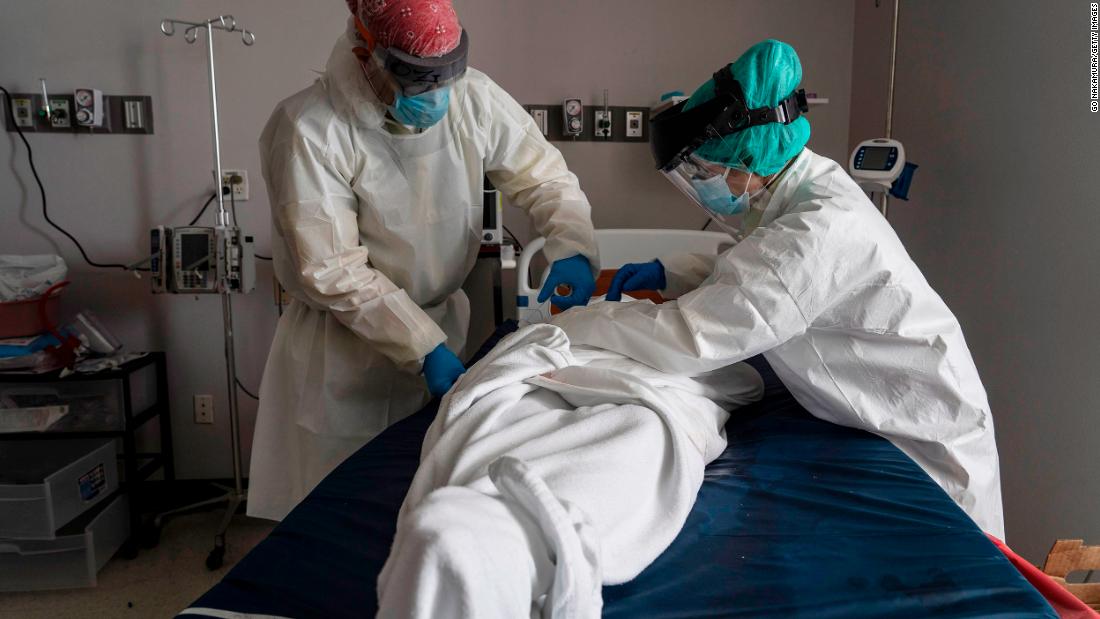To put that in perspective, the first reported case came on January 21. After 99 days, 1 million Americans became infected.
It took just 43 days after that to reach 2 million cases.
And 28 days later, on July 8, the US reached 3 million cases. Case number 4 million could be reported just two weeks after that.
As of Wednesday morning, more than 3.9 million people had been infected across the US, and more than 142,000 have died, according to data from Johns Hopkins University.
Some states are reporting record-breaking numbers of new cases. More governors are requiring masks, and dozens of hospitals are out of adult CU beds.
At least 27 states have hit the pause button on their reopening plans or set new restrictions to help curb the spread of the virus.
Where cases are surging
While some US leaders, including the President, have pinned the spike in coronavirus numbers on increased testing, it’s actually the prevalence of the disease that’s causing cases to climb.
A CNN analysis of testing data from the Covid Tracking Project reveals that the positive test rate — indicated by the average number of positive test results out of 1,000 tests performed — has increased significantly in many states that have seen the largest increases in new cases in recent weeks, including Florida, Arizona, Texas and Georgia.
Florida, for instance, saw an average rate of 35 positive results per 1,000 tests during the month of May. But in June, that number nearly tripled to 105. So far in July, the average rate has been 187 out of 1,000.
But Florida Gov. Ron DeSantis said Tuesday the state is on the “right course” in the fight against the virus.
“I think we will continue to see improvements, we just have to, particularly Floridians, have to continue doing the basic things,” the governor said.
Young people drive spread of cases in Los Angeles
California, the first state to shut down months ago, has now become a coronavirus hotspot, surpassing New York with the most coronavirus cases in the nation. Earlier this month, the governor shut down bars and indoor operations for restaurants and other businesses hoping to limit social gatherings in enclosed spaces.
“The tragedy of what we are witnessing is that many of our younger residents are interacting with each other and not adhering to the recommended prevention measures,” Dr. Barbara Ferrer, the county public health director, said in a statement.
Los Angeles Mayor Eric Garcetti told CNN earlier this week he was on the “brink” of issuing another stay-at-home order for the city, urging residents to avoid gatherings.
Why it’s now hard to control the spread of Covid
With the high transmission levels of the virus, traditional contact tracing — which health officials once said would be key in controlling the spread of the virus if cases were at manageable levels — has now become “impractical and difficult to do,” California Health Secretary Mark Ghaly said.
The state is working to refine strategies and continue to work with counties to build up their “tracing army,” but Ghaly warns that “even a very robust contact tracing program will have a hard time reaching out to every single case.”
Contact tracing is now harder all over the nation while testing results take days, according to the country’s leading expert on infectious diseases, Dr. Anthony Fauci. Quest Diagnostics, a leading commercial testing lab, said in a news release Monday that for some patients, testing results can take up to two weeks.
“The time frame from when you get a test to the time you get the results back is sometimes measured in a few days,” Fauci said Tuesday.
“If that’s the case, it kind of negates the purpose of the contract tracing because if you don’t know if that person gets the results back at a period of time that’s reasonable, 24 hours, 48 hours at the most … that kind of really mitigates against getting a good tracing and a good isolation.”
But challenges to control the spread also arise from ongoing debates surrounding face coverings. While at least 39 states have some time of mask requirement now in place, there are many leaders across the country who have resisted making masks mandatory.
Iowa City Mayor Bruce Teague made masks a requirement in public places and in outdoor places when social distancing isn’t possible, defying the state’s governor who says cities have no authority to put mask mandates in place.
“The scientific data and evidence is clear. Face coverings and masks are a safe, effective way to get case numbers down,” the mayor said.
Here’s what’s at stake:
If you don’t already know someone infected with Covid-19, officials have said that’s likely to change in the coming weeks as the country’s infections keep rising.
The previous forecast, published July 9, projected roughly 147,000 coronavirus deaths by August 1.
The future of the pandemic in the country will also help determine what school will look like.
Trump has said he’s pressuring governors to reopen schools in a push to reopen the country. But parents and educators have protested a return to class saying that while children may not get as sick from the virus, they can still contribute to transmission.
CNN’s Brandon Miller, Eileen McMenamin, Cheri Mossburg and Sarah Moon contributed to this report.


















